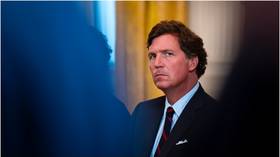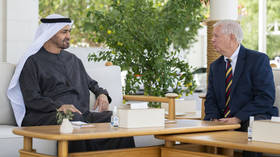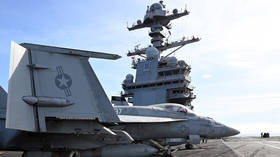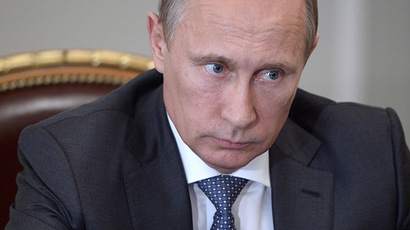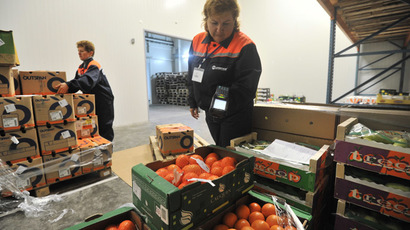European farmers say Russian import ban may sting, EU says ‘Ukraine is top priority’
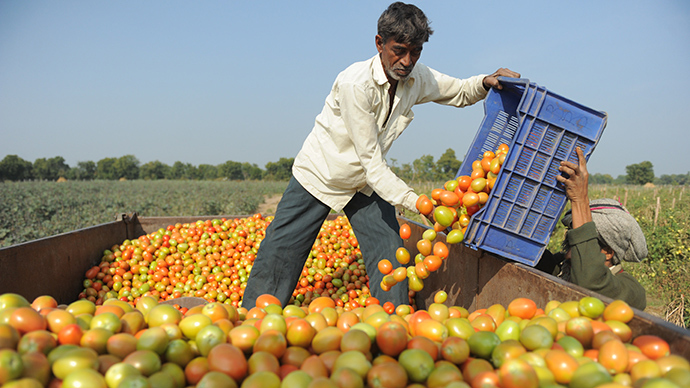
Russia’s import ban on agricultural goods from countries that sanctioned Moscow over the Ukraine crisis may have a negative impact on European producers, farmers say. However, the EU’s ambassador to Moscow insists the bloc's position will not change.
READ MORE: Russia to ban all US agricultural products, EU fruit & vegetable imports - watchdog
Russian President Vladimir Putin signed Wednesday a decree
imposing a one-year ban on agricultural produce,
foods, and raw materials from countries that have sanctioned
Russia. The list of banned or restricted goods is expected to be
approved by the government later in the week.
European agricultural businesses responded by saying they are
worried that the Russian import ban may have serious negative
consequences for them.
Finland may lose as much as 400 million euros (US$535 million) as
a result of Russia’s retaliatory sanctions. According to Heikki
Juutinen, the managing director at the Finnish Food and Drink
Industries’ Federation, sanctions would be “very bad
news” for his country, as about a quarter of Finland’s
exports go to Russia, local Yle radio station reported. The
situation may affect such big players as Valio – Finland’s
biggest dairy producer.
“This has the potential - and I stress potential - to become Economic Crisis 2.0,” Prime Minister Alexander Stubb told reporters in the Finnish city of Espoo, Reuters quotes.
However, Stubb also made clear the burden of retaliation had to be shared among EU members: “If sanctions hit Finland disproportionately, we will seek aid from our EU partners.”
...and if I don't get my #Valio milk and #Oltermanni cheese here, #Russia loses me. This is getting personal. http://t.co/7k580Jvnnq
— Petteri Lehtinen (@PetLeh) August 6, 2014
The German Farmers’ Association (Deutscher Bauernverband) said
the move could cause an increase of supply on the EU’s internal
market, which, as a result, would put additional pressure on
local producers.
“Russia is an important market for our key export goods,
primarily meat and dairy products,” said the group’s deputy
head, Udo Hemmerling, as quoted by Itar-Tass.
By the end of 2013, the major importers of dairy products to Russia were Finland, with 17.8 thousand tons worth US$19.6 million; Estonia, with 8.3 thousand tons worth $19.4 million; Poland, with 3.8 tons worth $8 million; and Lithuania, with three tons worth $7.3 million, according to Russia’s Federal Customs Service.
‘Issue of secondary importance’
However, Moscow’s retaliatory move will not change the European
Union’s position on Ukraine, the EU's ambassador to Moscow,
Vygaudas Ušackas, told RIA Novosti.
“Sanctions issue is of secondary importance in our relations.
We’ve faced much more important and fundamental questions that
must be addressed as soon as possible,” the diplomat said.
Ušackas expressed hope that in the nearest future, Moscow and the
EU will agree to take joint steps aimed at the de-escalation of
the Ukrainian crisis.

At the same time, the EU's policy of sanctions towards Russia
will cost the bloc – although the exact impact is currently
unknown – Thierry Mariani, co-chair of Association Dialogue
France-Russe, said.
“For now, no one can say exactly how much [European]
companies will lose – too little details is known,” Mariani
said, commenting on the news to RIA Novosti.
Western officials have been warning that a Russian import ban may
hit consumers inside the country too.
According to Hemmerling, prices for pork in Russia have already
increased significantly. “So Russian consumers will also have
to pay for sanctions of their government,” he said.
However, Russian authorities assure that the import ban will not
affect the country’s consumers.
Restrictions will only be imposed on products that Russia can
produce itself or those “it can easily do without,” said
Igor Rudensky, a United Russia MP who chairs the State Duma's
Committee on Economic Policy. Shelves in the shops won’t be
empty, he added, as cited by the ruling party’s press service.
Also, the decision to prohibit products from a number of foreign countries would stimulate Russian manufacturers, according to another MP for United Russia, Irina Yarovaya. In her opinion, many producers of “quality products” who previously could not make it to supermarket shelves will now be able to sell their goods while simultaneously developing their business.

Russian retailers say it would take up to two months to fully
replace all the banned products. Analogs could be delivered from
the CIS, Africa, China, Egypt, and Latin America.
“Opportunities to replace produce will be sought both within
the country and in the countries that have not supported
sanctions [against Russia],” Andrey Karpov, executive
director for the Retail Companies Association, told Itar-Tass.
Additionally, Russia's regional players may get a chance to
increase their market share.
Russia’s agricultural watchdog Rosselkhoznadzor has already given
the green light for 91 Brazilian suppliers of animal origin
foods. The list of companies that are allowed on the Russian
market has been published on the agency’s website. It includes 31
suppliers of beef by-products, 27 suppliers of poultry and beef,
four companies that would import pork and pork by-products to
Russia, and three dairy suppliers.
The final list of European and US products to be banned has yet
to be discussed or confirmed by Russian Prime Minister Dmitry
Medvedev. He is scheduled to review it on Thursday, according to
Medvedev’s spokeswoman, Natalya Timakova. The preliminary list,
disclosed by the Russian watchdog on Wednesday, is a “working
draft,” Timakova said.
‘Very logical response’
Meanwhile, EU sanctions against Russia have stirred up some
critics, who argue that Europe and its citizens will be the ones
hurt by the move.
“It is no wonder that now there will be reactions and they
will be very negative because there are Europeans who will pay
the bills,” Anna van Densky, political commentator for EU
Reporter magazine, told RT.
Moreover, the “adventuristic” EU sanctions were
introduced without proper consultation with the European
Parliament – the only institution directly elected by and
accountable to European citizens – van Densky said. Instead of
consulting the people, the European Council reportedly held talks
with US President Barack Obama, she said, adding that there was a
“dramatic lack of democratic basis in this decision.”
As for the import ban ordered by Putin, van Densky believes it to
be a “very logical response.”
It would be “very strange” to expect from the elected
head of state “a reaction close to Jesus Christ, that he
would offer the other cheek” in response to Western
sanctions.
“What happened is absolutely predictable, and it is the
result of political adventurism, because the situation in Ukraine
– and everybody knows it – has no other solution than a
negotiated solution,” Van Densky stressed.
On the other hand, the import ban may benefit local farmers, van
Densky argued: “It is very good news for Russian agricultural
producers because they will try to do their best to fill the gap
and it will boost Russia’s agriculture.”


